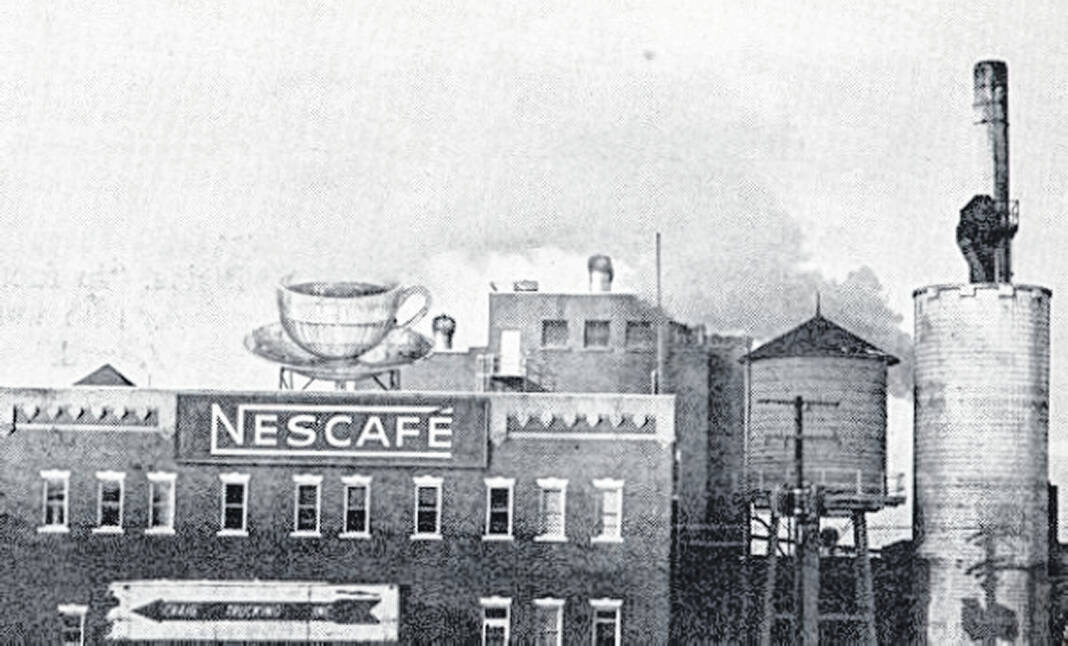
SUNBURY — Imagine being able to constantly smell freshly-brewed coffee in the air where you lived before there were ever drive-thru coffee shops to frequent. That was a reality in the village of Sunbury, which at one time had a Nestlé plant on South Columbus Street.
Before becoming the namesake of what is now the world’s largest food and beverage company, German-born confectioner Henri Nestlé (1814-90) developed an infant formula in Switzerland in 1867. In 1905, Nestlé’s company merged with the Anglo-Swiss Condensed Milk Company.
The John Wildi Evaporated Milk Company (formerly the Sunbury Co-Operative Creamery) was sold in 1919 to Nestlé. “Butter, cheese and evaporated milk were still the primary products,” said the Big Walnut Area Historical Society’s (BWAHS) website. When Nestlé official Ernest Fivaz and his family moved to Sunbury in 1924, the plant began making baby formula.
The corporate website nestle.com said that in 1938, “Nescafé is launched as a ‘powdered extract of pure coffee’ that delivers coffee’s natural flavor just by adding hot water. It’s the brainchild of Max Morgenthaler, who created the product when the Brazilian government asked Nestlé & Anglo-Swiss to find an outlet for its huge coffee surplus.”
“Although much of the research happened elsewhere, in 1939, before convenience foods were popular, Sunbury produced 350 pounds of instant coffee an hour,” the BWAHS site said. Nescafé caught on with the United States Armed Forces during World War II. “In 1943 they received the Army-Navy E Award for high achievement in producing Nescafé for every serviceman’s ration pack. The pleasant aroma of brewed coffee covered the area and resulted in more than one person stopping in the town to inquire about its source. The cup on top of the plant with the steam coming up from behind it became a Sunbury trademark.”
“The Sunbury plant was the first to produce instant tea, Nestea, in 1946,” said the BWAHS site. “In 1968, Sunbury added the first continuous Freeze-Drying process and added Taster’s Choice to the coffee line. This became the primary product from Sunbury. In 1981, a $27 million five-story addition for a natural decaffeination plant was built in Sunbury. Daily the plant removed 2,500 pounds of caffeine from a million pounds of coffee beans and sold it to Coca-Cola for use in soft drinks. Caffeine became the new primary product for this plant.”
However, due to a drop in demand for decaffeinated coffee, the Sunbury plant closed in 1993. “At the time it stopped production, Nestlé’s was responsible for 32% of the village income tax, 40% of the water fees, and owned 250 acres of land,” said the BWAHS site.
Although some activists and environmentalists have been critical of Nestlé’s actions over the years, the BWAHS site said the company “was always a good neighbor” to the village of Sunbury, by helping to provide the up-ground reservoirs, building a water tower, hauling in water during a 1952 emergency and replacing a sewer line in 1979.
Although Nestlé no longer has a facility in Sunbury, its products can be found on the shelves in stores thoughout the city. The company’s many brands include Alpo, Boost, Coffee-Mate, Friskies, Gerber, Häagen-Dazs, KitKat, Lean Cuisine, Nature’s Bounty, Nesquik, Perrier, Stouffer’s, Toll House, and of course, Nescafé and Nestea.
Sunbury historian Polly Horn discussed the “Sunbury Co-Operative Creamery to Nestlés” Thursday night at The Myers Inn. This Harlem Township Heritage event was originally to have taken place at the township firehouse in Galena.


